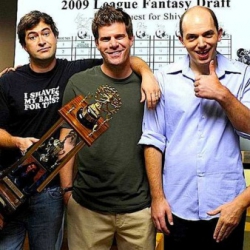Sports Illustrated is set to launch a fantasy sports betting application in early July 2014. The fantasy sports app, called “Fun Nation“, will offer real money wagers on daily and weekly fantasy sports events.
While fantasy sports are considered gambling, an exception exists in the Unlawful International Gambling Enforcement Act of 2006 for such betting. The UIGEA set aside an exemption for fantasy sports, horse racing, and lottery gaming. While the US Congress wanted to eliminate legal online casinos, poker rooms, and sportsbooks when it passed the Safe Port Act back in September 2006, it did not want to offend the horse racing industry, the multi-state and state-sanctioned lottery associations, or the fantasy football playing public.
13% of US Adults Play Fantasy Sports
According to the Fantasy Sports Trade Association, approximately 13% of the adult population of the United States play fantasy sports each year. The industry is thought to have generated $3.38 billion in the American economy in 2012. That number continues to grow each year. Now, Sports Illustrated has decided it wants in on the action.
The first app, set to launch sometime in the next few days or weeks, is called “Baseball Throwdown”. Players from Major League Baseball will be featured in the games. Real money can be wagered on the games, which will include direct competition against one or more other gamblers. Eventually, SI Fun Nation software applications will exist for NFL, NBA, and NHL games. Other daily fantasy sports services offer Nascar gaming, so other sports might be added if the original launch is a success.
What Separates Fantasy Sports from Betting?
Gamblers might wonder how the UIGEA law reads. If a person places a wager in which they bet on one team or one single athlete, it is considered gambling. If a person places a wager in which players from two or more teams form an imaginary or fantasy sports team, then it is considered fantasy sports.
In fantasy baseball, a team “owner” would select an assortment of single players from a variety of different teams. Someone might select Albert Pujols of the Los Angeles Angels, Yasiel Puig of the Los Angeles Dodgers, and Chris Davis of the Baltimore Orioles. One could not select only members of the Angels, Dodgers, or Orioles for their team.
If someone was a New York Yankees or a Boston Red Sox fan, they couldn’t select a squad of all-Yankees or all-Red Sox. They could (God forbid) mix up players from the two squads, though. Even fans for the lowly Arizona Diamondbacks could select a team mostly of their hometown players, with one or more of a rival teams’ players added in. The software registers a team as invalid or illegal until players from two or more MLB baseball teams are selected.
Why Is Fantasy Sports Legal?
Fantasy sports is considered legal, because it is considered a game of skill. When playing Fun Nation fantasy football, a player would receive a certain amount of money or “salary cap” to fill out their starting lineup. Different players would be assigned different salaries, based on past performance. Sports Illustrated fantasy football therefore becomes a game of resource allocation, trying to maximize ones fantasy dollars to field the best team. The U.S. Congress considers this a skill–not pure luck.
It also helps that the game is played against other competitors and not against “the house”. You match your skills against another player’s skills to see who is better. Luck plays a major hand in such games, especially when injuries and scoring opportunities happen, but the selection of teams is considered a skill. Another reason fantasy sports is considered more legitimate than sports gambling is this: games cannot be fixed the way they can with straight betting.
Mainstream Acceptance of Fantasy Sports Betting
The main reason fantasy sports are legal is the wide acceptance of it in the general public. Nothing like 13% of the US population gambles, so fantasy sports is mainstream. When you consider that men represent about 90% of the fantasy sports playing public, one can imagine that about 25% of the adult males in the United States play fantasy sports each year.
These people are Republicans and Democrats. To ban such gaming would be highly unpopular with a vocal and influential part of the American public. While some spouses (“fantasy football widows”, they’re called) might be for a federal ban, the general backlash would be tremendous. Thus, betting on fantasy sports is legal in the United States.
Comments on Daily Online Fantasy Sports
Jim DeLorenzo, Digital Vice President of Sports Illustrated Digital, recently told an interviewer, “Our audience wants to play fantasy sports. The mandate is to make the experience so easy that even my dad could use it.”
Paul Charchian, President of the Fantasy Sports Trade Association, says the trend towards more online fantasy sports is growing and getting bigger. The daily fantasy sports sites are a big part of the growth these days. With daily fantasy sports sites set to become the next big trend in the industry, Charchian says, “It’s gotten more investment in the past two years than in the history of fantsay sports combined.“

